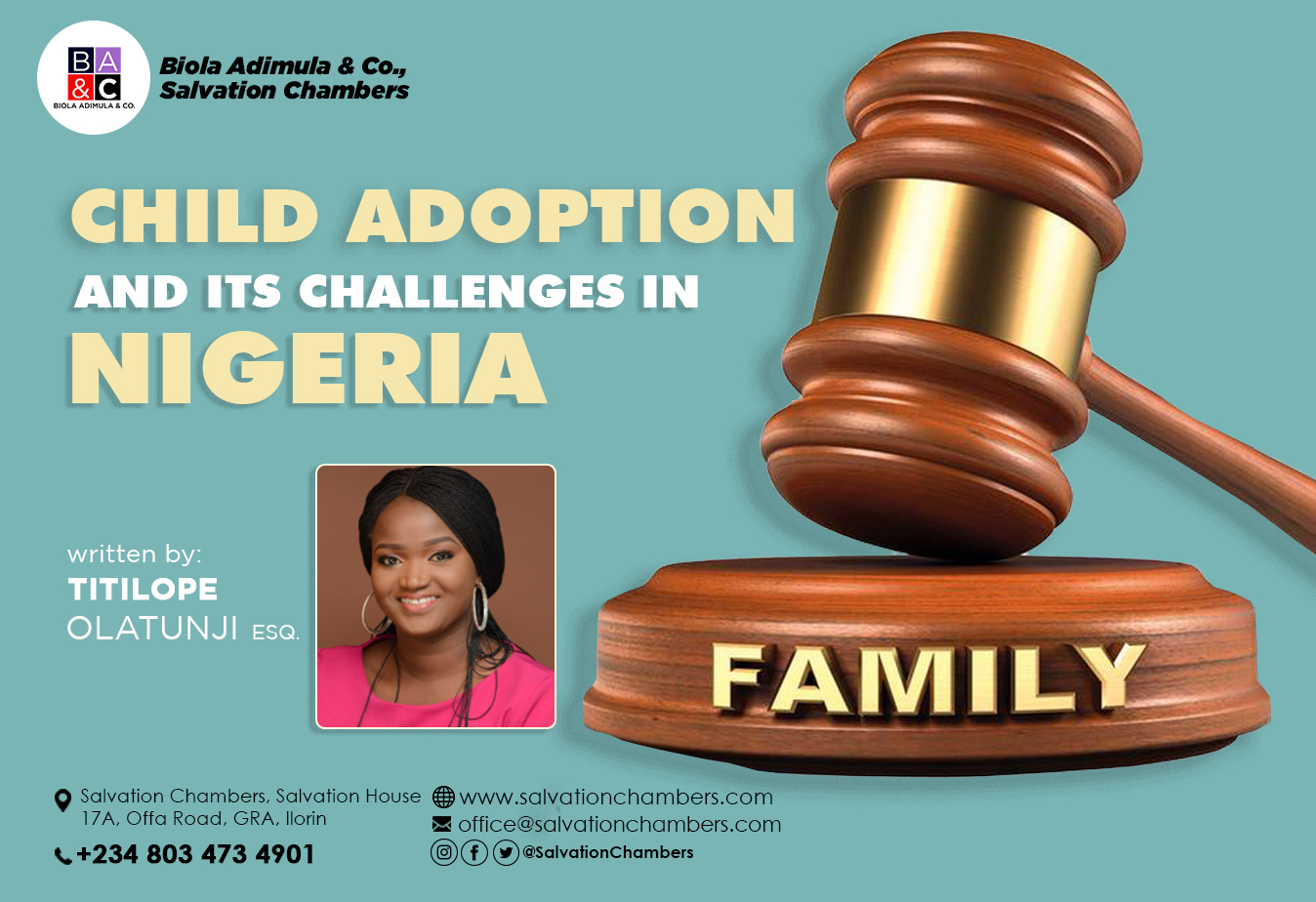Introduction
Adoption is a legal process whereby a person assumes the parenting for another and in so doing, permanently transfers all rights and responsibilities from the original parent. Unlike guardianship or other systems designed for the care of the young, adoption involves permanent transfer of parental rights from the biological parents to the adopting parent.
Adoption is a lifelong and inter-generational process that affects the status of the triad i.e. the birth family, the adoptive child and the adoptive families forever. Also adoption is one of the most complementing, most enduring and incidentally, the cheapest way of meeting the grave needs of certain children who are socially deprived and are in need for normal home life.
Some Reasons for Adoption
- Childlessness
- Companion for an only child
- Rescue an abandoned child
- Desire to replace a dead child
- Stabilize a marriage
- Legitimate an illegitimate child
- Sustain a particular line of descent
- Rescue a child who is in an irreversible situation of abandonment
- Relieve parents who are unable to take care of their child.
The Rights of an Adopted Child
Adoption touches upon the adopted child’s status; hence it affects his legal rights, welfare and obligations.[1]
- An adopted child becomes a complete member of the adopter’s family, takes on the adopter’s surname and assumes the rights and privileges of a biological child, including the right of inheritance.
- Also, a relationship of consanguinity between the adopted child and all members of the adopter’s family is established.
As a result, marriage or sexual relationship between the adopted child and any member of the adopter’s family is absolutely prohibited.[2] Thus, adoption confers on the child all the rights vis-à-vis his adoptive parents as if the child had been born to them in lawful wedlock as well as imposes on the adoptive parents’ parental responsibility equivalent to that of the natural parents of the child.
Caution
It is impossible to adopt a child without a court order, a mere agreement in which a parent seeks to transfer his rights and duties to someone else is ineffective and will not be recognized as an adoption.[3]
Challenges of Child Adoption in Nigeria
Child adoption in Nigeria has faced a lot of challenges and it has made some people who ought to have children through this means to reject child adoption in its entirety[4]. Some of the challenges of child adoption in Nigeria are as follows:
i. Cultural Practices
Most Northern states of Nigeria are yet to adopt the Child Rights Act as they do not recognize adoption. In Igbo land, there is a general belief that it is only a biological child of a man that can inherit his properties and stand as his heir in that family and for proper recognition.
ii. Social Stigmatisation
In Nigeria, having children by a man seemingly makes him a complete man. People tend to look down on adopted children and adopting families as they feel it is improper to adopt children. Social stigmatization has deprived most families from experiencing the joy of having children through alternative ways[5].
iii. Lack of Proper Sensitisation on Child Adoption
Most people still don’t know what child adoption is all about, or the process of child adoption or its advantages. This is because of lack of proper sensitization by the government.
iv. Financial Constraints
Low income family find it very difficult to embark on child adoption as it is seen as an adventure for the high income earners. Different states have different fees charged depending on the sex of the baby. Adopting male children are usually more expensive. Financial constraints have denied some families from experiencing the joy of having a child to call their own[6].
v. Genetically Inherited Traits
Most children, because of lack of medical care, have some deformities or sickness or genetic challenges which could cause panic, fear, loss of resources, frequent medical attention on the adopting family whose joy of having a child might turn to sadness or pain caused by the medical challenges of the child. Most adopted children grow up to manifest strange genetic traits that can affect the peace of a family and the society at large especially if it is a negative trait.
vi. Religious Reasons
Because of religious reasons and beliefs, most families in need of children, have bluntly refused to consider adoption as an alternative. The “faith factor” encourages people to wait on God patiently in whatever situation as God can do all things.
vii. Procedural Bottlenecks
There are a lot of procedural bottlenecks that has negatively affected the process of child adoption in Nigeria. A lot of time is wasted in the process of child adoption as the whole system is bureaucratic.
viii. Fear of Confidentiality
People fear that the identity of the biological parents of the child may be revealed to the child or that in the future, the biological parent(s) may turn up and lay claim to the child. Even though confidentiality is the watchword of the welfare unit or orphanages involved, sometimes that trust is broken and sensitive information are released to people who ought not to have.
ix. Advent of Modern Fertility Techniques/Alternatives
The introduction of IVF (Intro-vitro Fertilization), surrogacy, etc. has impeded the growth of child adoption in Nigeria. Many people prefer to keep on trying out these techniques/measures which enable them to carry a baby or have a baby with their genes/genetic traits than to adopt a child.
Recommendation
To improve knowledge about Child adoption in Nigeria, the local government areas should be utilized in disseminating information on child adoption as they are at the grassroots level and have more influence on the people in their area.
[1] Nwogugu, E. I., Family Law in Nigeria, (Ibadan: Heinemann, 1990), p. 312.
[2]Ibid at 2
[3]Clement Nancy Oluwakemi, Offence of Adoption: Law and Policy in the Nigeria Legal System, A Research Work Submitted To The Faculty of Law University of Ilorin, Ilorin, Nigeria.
[4] Eke C. B., Obu H. A., Adimora G. N.” An article on the perception of child adoption among parents/care givers of children attending pediatric out patients clinics in Enugu state”, Nigeria. http://www.njcponline.com/text.asp/188/127549 accessed 04/09/2017
[5] Oladokun, Acceptability of child adoption as management option for infertility in Nigeria. Evidence form focus group discussions (2009) Afr J. Reprod Health Journal pp 79 – 89
[6] http://www.adopt.com/nigeria accessed on August 3, 2017

